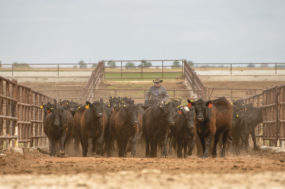The 11.9 percent fail/deferred rate is consistent with the average for all the clinics that began in 2005 according to Eldon Cole, a livestock specialist with University of Missouri Extension.
The cooperating veterinarians check the bulls inside and out for such things as accessory sex gland normality, scrotal circumference, penis/prepuce problems and semen quality. Structural soundness is evaluated by the veterinarian and the extension livestock specialist.
The bulls found to be unsatisfactory had a variety of problems. Some had more than one reason for failing.
The single biggest failure reason was a lower than 70 percent normal sperm count. Five bulls fell in that category and four bulls had penile/prepuce problems that could prevent the bull from servicing a female. Two bulls had a scrotal circumference too small to pass and one bull had a swollen testicle.
The bulls were in nice condition with an average body condition score of 6.1. The range was 5.0 to 7.5. Soundness scores averaged 5.6 on a 1 to 10 scale; the range was 2 to 7.
A common problem on the bulls was long, curved toes. Most of this problem could be managed with a good hoof trimming periodically. The average age of the bulls was 2.9 years with a range from 10 months to 9.5 years.
The predominant breed at the clinics, as in the past, was Angus with 45.5 percent. The next largest number was Hereford at 12.9 percent and Gelbviehs with 10.9 percent.
Thirty-six of the bulls were tested for trichomoniasis and all of results were negative.
“All of the participating veterinarians reported an increased interest this year among their clientele in breeding soundness exams and trich testing. Perhaps the increased interest is a reflection of the promising cattle market in the future.
Farmers are aware that the bull is a critical part of the cow herd. Bulls, like the rest of the cattle market, are expensive so it’s vital to keep them working as long as possible,” said Cole.
The BSE clinics are jointly sponsored by the University of Missouri Extension, cooperating veterinarians and Pfizer Animal Health and Genomics. The clinics help focus attention on the value of a BSE, trich testing, vaccination needs of the bull, parasite control and using both objective and subjective data in evaluating bulls.
—From University of Missouri Extension news release







